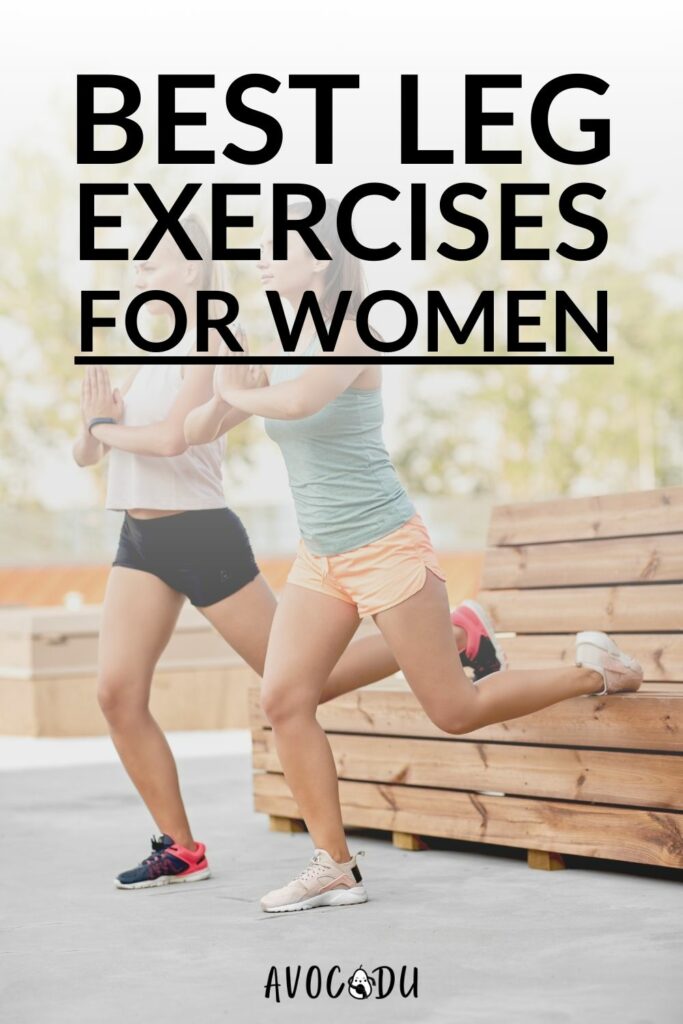If you’re wanting to achieve strong, lean legs that turn heads and keep you feeling powerful, you’re in the right place.
Toning your lower body isn’t just about looking great in your favorite jeans; it’s about building the kind of strength that supports every movement you make.
For many women, leg workouts are the secret to a balanced fitness routine that enhances strength, stability, and endurance.
A focus on lower body exercises can help you burn calories, build lean muscle, and achieve those slim, toned legs you’re after.
Whether you’re hitting the gym or working out at home, we’ve got the best leg exercises — from squats and lunges to deadlifts and calf raises — that will target every muscle in your legs, helping you reach your goals and feel unstoppable.
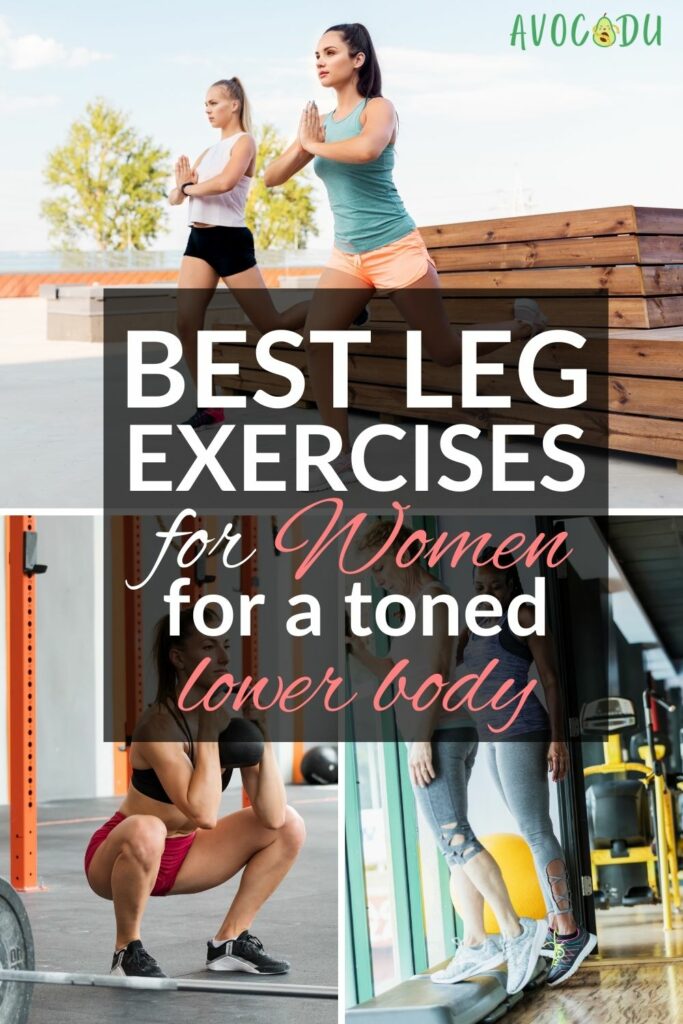
This post may contain affiliate links, which helps keep this content free. Please read our disclosure for more info.
Why Focus on Leg Exercises?
Your lower body is home to some of the largest and most powerful muscles in your body, including the quadriceps, hamstrings, and glutes. These muscles aren’t just important for aesthetics; they play a vital role in your overall strength, stability, and health.
By targeting these muscles with specific leg exercises, you can tone and define them while also reaping numerous health benefits.
For women, in particular, incorporating leg exercises into a regular fitness routine is crucial for several reasons:
Strength and Stability: Strong legs are the foundation of almost every movement you make, from walking up stairs to carrying groceries.
By focusing on simple leg exercises like squats and lunges, you can improve your balance and stability, which reduces the risk of falls and injuries, particularly as you age. If you’re a runner, a weightlifter, or simply want to feel more confident in your daily activities, building a strong lower body is essential.
Metabolic Boost: Your legs house some of the biggest muscles in your body, and engaging these muscles can significantly boost your metabolism.
When you perform exercises like deadlifts, squats, and lunges, you’re not only building muscle but also increasing the number of calories your body burns at rest.
This metabolic boost is especially beneficial if you’re looking to lose fat and build lean muscle.
Hormonal Health: Engaging in lower body workouts can have a positive impact on your hormone health. For women, especially, these workouts can help regulate hormones that affect everything from mood to metabolism.
Additionally, strength training for the lower body can improve bone density, which is crucial for preventing osteoporosis and maintaining overall wellness as you age.
Enhanced Athletic Performance: A strong lower body is not just about looking good; it’s about performing better in all areas of fitness and life.
Whether you’re into running, cycling, or simply want to keep up with your kids, strong legs provide the power and endurance needed to excel in physical activities.
By incorporating a variety of leg exercises into your routine, you can build the strength and agility required for peak performance in any sport or activity.
Improved Posture and Reduced Pain: Strong leg muscles contribute to better posture by supporting your spine and pelvis, which helps alleviate lower back pain and reduce the risk of injury.
When your legs are strong, your entire body moves more efficiently, and you’re less likely to experience discomfort from daily activities or prolonged periods of sitting.
Best Leg Exercises for Toned and Lean Legs
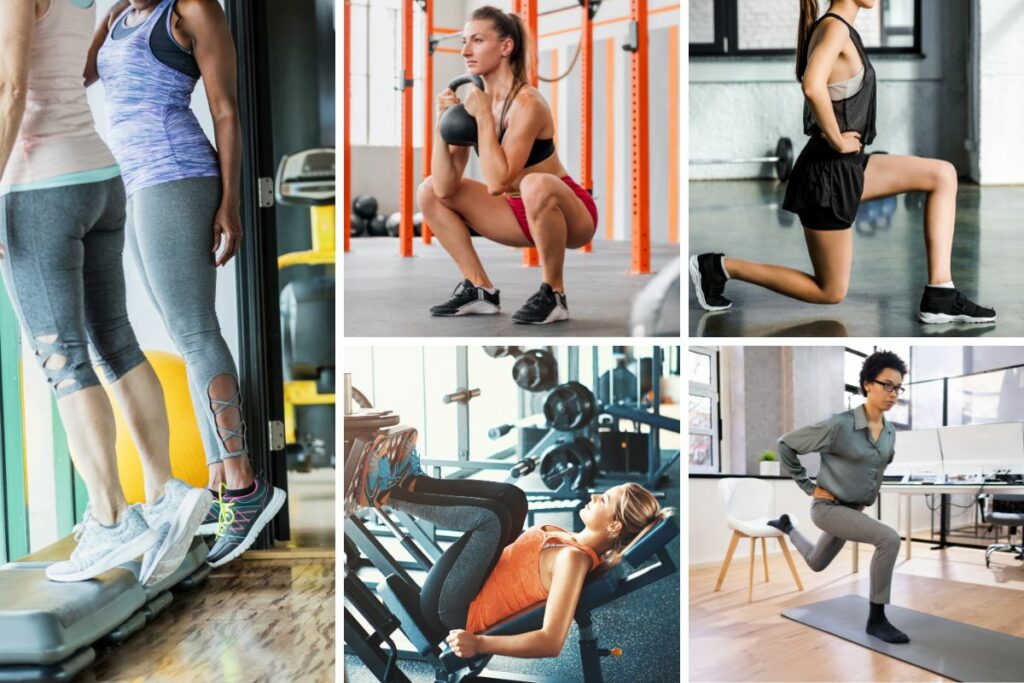
To build a strong and toned lower body, it’s important to include a variety of exercises that target different muscle groups.
Here’s a breakdown of some of the best leg exercises, including variations that focus on specific parts of the muscles to help you achieve a well-rounded workout.
1. Squats
Squats are a powerhouse exercise that engages multiple muscles at once, making them one of the best leg workouts you can do.
They primarily target the quadriceps, but they also work the hamstrings, glutes, and calves. Squats help build overall strength and enhance muscle definition throughout the lower body.
- Traditional Squats: This basic form targets the quadriceps and glutes. Ensure your feet are shoulder-width apart and your knees stay aligned with your toes as you lower your body.
- Goblet Squats: Holding a weight in front of your chest, this variation helps to focus more on the core and upper thighs, making it a great addition to your routine if you want to enhance your lower body stability.
- Sumo Squats: By widening your stance and pointing your toes outward, sumo squats shift the focus to the inner thighs and glutes. This variation is particularly effective for targeting the adductor muscles and adding variety to your leg routine.
- Split Squats: This variation, also known as Bulgarian split squats, involves elevating one foot behind you on a bench or step, which shifts more weight onto the front leg. This exercise emphasizes the quads and glutes while also challenging your balance and stability.
- Narrow Squats: This variation of the traditional squat focuses on targeting the outer muscles of the quadriceps, particularly the vastus lateralis. In this exercise, you bring your feet closer together, about hip-width apart or narrower, which shifts more of the emphasis to the outer quads while still engaging the glutes and hamstrings.
2. Lunges
Lunges are incredibly versatile and effective for toning the legs. They primarily target the quads, hamstrings, and glutes, but they also help in creating symmetry and balance in the lower body.
- Forward Lunges: This standard version targets the quadriceps and glutes. To perform, step forward with one leg, lowering your hips until both knees are bent at about a 90-degree angle.
- Reverse Lunges: Stepping back instead of forward places more emphasis on the glutes and hamstrings, making it a great alternative for those looking to target the back of the legs.
- Walking Lunges: By moving forward with each lunge, you add a cardio element to the exercise while engaging the core more actively. This variation is excellent for enhancing balance and coordination.
- Curtsy Lunges: This variation involves stepping one leg behind and across the other, which targets the inner thighs and glutes, offering a unique angle to your typical lunge workout.
3. Leg Press
The leg press is a staple in many gym routines because it allows for significant weight to be lifted safely, targeting the quadriceps, hamstrings, and calves. This exercise is perfect for those who want to build strength and power in the lower body without putting too much strain on the back.
- Standard Leg Press: With feet shoulder-width apart on the platform, this position primarily targets the quads. Adjusting your foot placement can alter which muscles are emphasized.
- Wide-Stance Leg Press: Placing your feet wider apart on the platform targets the inner thighs and glutes more intensely. This variation is great for adding variety and focusing on different areas of the legs.
- Single-Leg Press: Performing the leg press with one leg at a time can help address any imbalances in strength between the legs while also engaging the core for stability.
4. Deadlifts
Deadlifts are a comprehensive exercise that primarily targets the hamstrings, glutes, and lower back, providing a full-body workout while focusing on the posterior chain. They are essential for building overall strength and muscle mass in the lower body.
- Conventional Deadlifts: This standard form emphasizes the hamstrings and glutes. Keeping the barbell close to your body as you lift helps ensure proper form and maximize muscle engagement.
- Romanian Deadlifts: By keeping your legs straighter and pushing your hips back, this variation places more focus on the hamstrings and lower back, making it ideal for those looking to strengthen the posterior chain.
- Sumo Deadlifts: A wider stance with toes pointed outward shifts the focus to the inner thighs and glutes. This variation also reduces the strain on the lower back, making it a safer option for those with back concerns.
- Single-Leg Deadlifts: Performing this exercise with one leg improves balance and engages the core while targeting the hamstrings and glutes more intensively.
5. Calf Raises
While often overlooked, calf raises are essential for developing strength and definition in the lower legs. Strong calves are not only important for the appearance of well-toned legs but also play a crucial role in balance and stability.
- Standing Calf Raises: This basic form targets both the gastrocnemius (the larger calf muscle) and the soleus (the muscle underneath). To perform, raise your heels off the ground while keeping your knees straight.
- Seated Calf Raises: By performing calf raises while seated with weight on your knees, you can target the soleus muscle more directly. This variation is effective for building overall calf strength and endurance.
- Single-Leg Calf Raises: Performing calf raises on one leg increases the intensity and helps correct any muscle imbalances between the legs.
- Donkey Calf Raises: By bending over at the waist and placing your hands on a stable surface while raising your heels, this variation places more emphasis on the gastrocnemius and is great for building size and strength in the calves.
Including these exercises and their variations in your workout routine will ensure you target all the major muscle groups in your legs, promoting balanced strength and a toned, lean appearance.
Tips for Optimizing Your Leg Workouts
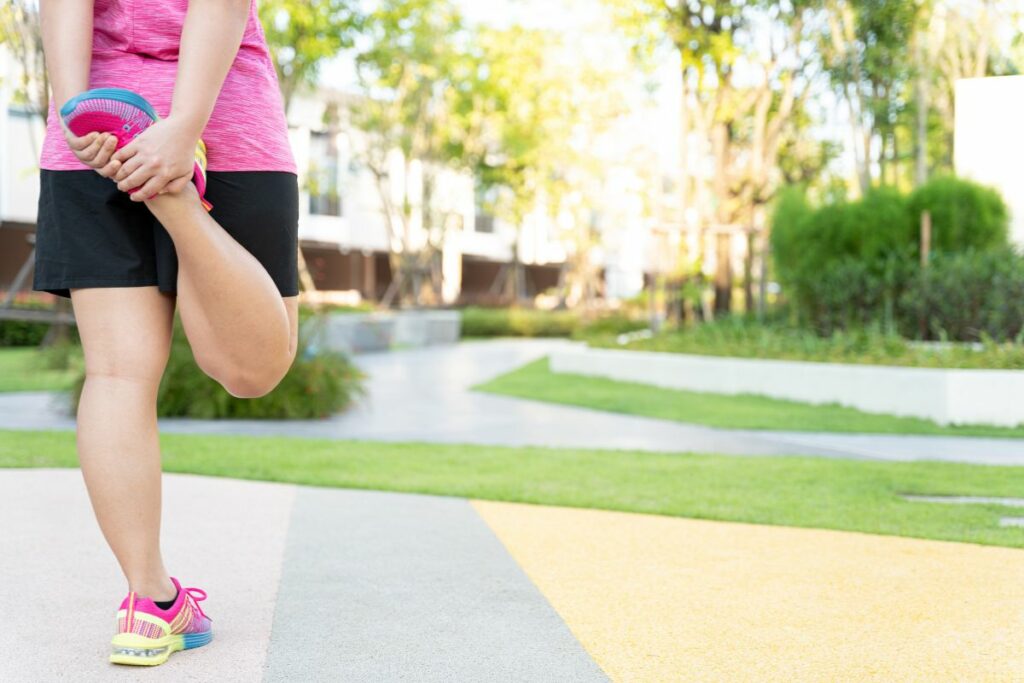
To get the most out of your best leg workouts, keep these tips in mind:
- Warm-Up Properly: Always start with a good warm-up to prepare your muscles for exercise and prevent injury. Dynamic stretches and light cardio are great options.
- Focus on Form: Proper form is key to maximizing effectiveness and avoiding injuries. If you’re unsure about your form, consider working with a trainer or watching instructional videos.
- Include Variety: To avoid plateaus and keep your muscles challenged, mix up your workouts with different leg exercises and variations. This not only keeps things interesting but also ensures comprehensive muscle development.
- Recovery is Crucial: Give your muscles time to recover between workouts. This helps in muscle growth and prevents overtraining, which can lead to injuries.
Common Mistakes to Avoid in Leg Workouts
Even the most effective leg exercises won’t deliver the results you’re looking for if they’re not performed correctly. To maximize your progress and prevent injuries, it’s important to be aware of some common pitfalls when working out your lower body.
Here are some mistakes to avoid:
Ignoring the Warm-Up:
Skipping the warm-up is one of the biggest mistakes you can make before any workout, especially when it comes to leg exercises.
A proper warm-up increases blood flow to the muscles, prepares your body for the stress of exercise, and enhances your range of motion. Failing to warm up can lead to muscle strains and injuries, reducing the effectiveness of your workout and potentially sidelining you for weeks.
Aim to spend at least 5-10 minutes on dynamic stretches and light cardio to properly prepare your muscles and joints for the workout ahead.
Overtraining:
While it might be tempting to push yourself hard in pursuit of faster results, overtraining can actually hinder your progress. Your muscles need time to recover and rebuild stronger after each workout.
Without adequate rest, you risk overuse injuries, muscle fatigue, and burnout, which can derail your fitness journey. It’s important to schedule rest days between intense leg workouts to allow your muscles to repair and grow.
Listen to your body and recognize the signs of overtraining, such as persistent soreness, fatigue, or a decrease in performance, and adjust your routine accordingly.
Neglecting Certain Muscle Groups:
A well-rounded leg workout should target all the major muscle groups, including the quadriceps, hamstrings, glutes, and calves.
Many people focus too much on one area, such as the quads, and neglect others, leading to muscle imbalances that can affect posture, stability, and overall performance.
For instance, only doing exercises like squats and leg presses might build strong quads, but without hamstring and glute work, you risk creating an imbalance that could lead to knee or back injuries.
Make sure to include a variety of exercises in your routine that address each muscle group, such as deadlifts for the hamstrings, lunges for the glutes, and calf raises for the lower legs.
Poor Form and Technique:
Performing exercises with improper form is another common mistake that can lead to injury and prevent you from effectively targeting the intended muscles.
For example, allowing your knees to cave in during squats or lunges can strain your joints and reduce the effectiveness of the exercise.
Similarly, rounding your back during deadlifts puts unnecessary stress on your spine. It’s essential to focus on maintaining proper form and technique for each exercise.
Consider starting with lighter weights to master the movement patterns, and if needed, seek guidance from a fitness professional or trainer to ensure you’re executing the exercises correctly.
Not Progressively Overloading:
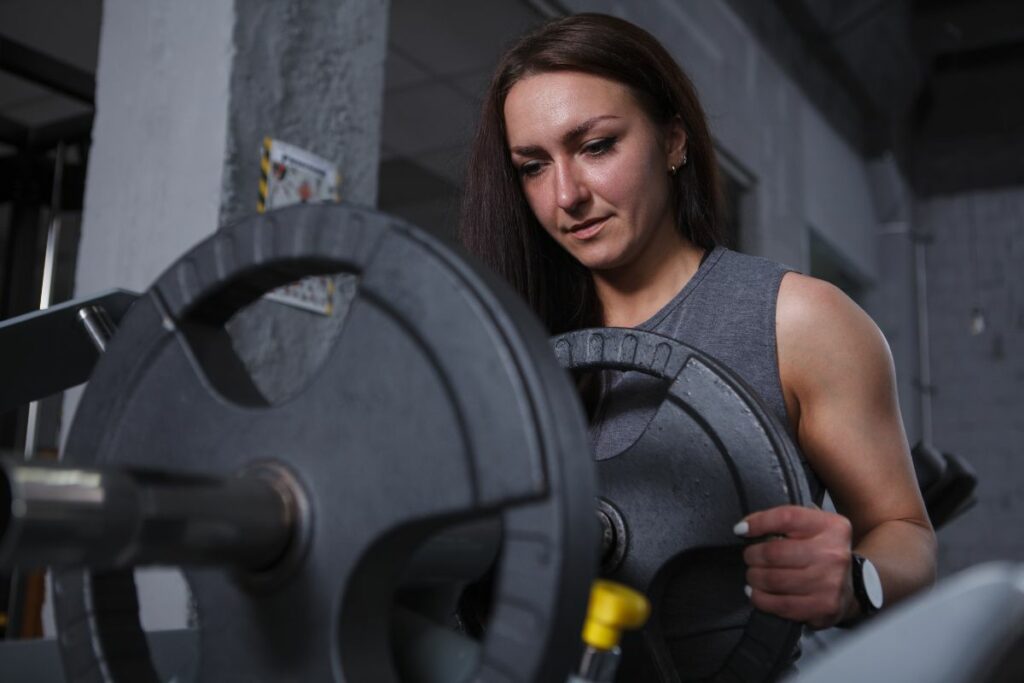
Sticking to the same weights, reps, or sets week after week can lead to a plateau in your progress. Your muscles need to be continually challenged to grow stronger and more toned.
Progressive overload—gradually increasing the weight, reps, or intensity of your workouts—is key to making consistent gains.
Ensure that you are regularly assessing your performance and increasing the difficulty of your workouts to keep your muscles adapting and growing.
Inadequate Recovery and Stretching:
Recovery doesn’t just mean taking a rest day; it also involves incorporating stretching and mobility work into your routine.
Stretching after workouts helps to reduce muscle soreness, improve flexibility, and prevent injury by maintaining a good range of motion in your joints.
Foam rolling can also be beneficial to release muscle tightness and aid in recovery. Make it a habit to spend at least 10 minutes stretching and cooling down after each leg workout to support muscle recovery and maintain flexibility.
Improper Footwear:
Wearing the wrong type of shoes during leg workouts can affect your performance and increase the risk of injury.
For exercises that involve heavy lifting, like squats and deadlifts, wearing flat-soled shoes or weightlifting shoes with proper support and grip is ideal. Running shoes with too much cushioning can destabilize your stance and reduce your ability to lift safely.
Choose the appropriate footwear for your workout to ensure proper support and alignment during your leg exercises.
By avoiding these common mistakes, you can maximize the effectiveness of your leg workouts, reduce the risk of injury, and achieve your fitness goals more efficiently.
Remember, quality over quantity is key, and taking the time to do things correctly will pay off in the long run.
Take Your Leg Workouts to the Next Level
Focusing on your lower body with the best leg workouts can deliver impressive results, from sculpted thighs to lean, toned legs.
To truly transform your legs, consistency and proper technique are key. By incorporating a variety of exercises and avoiding common mistakes, you’ll be well on your way to achieving a strong, beautifully defined lower body.
To accelerate your progress, consider pairing your strength training with a fat-loss program designed to help you burn fat while building muscle.
The 21-Day Fat Loss Challenge is perfect for those looking to shed extra pounds and reveal the muscle definition you’ve been working on.

This program combines high-intensity workouts with a structured diet plan to help you lose fat, boost your metabolism, and enhance muscle tone, making it an ideal complement to your leg training.
Get ready to see faster results and take your fitness to the next level!
